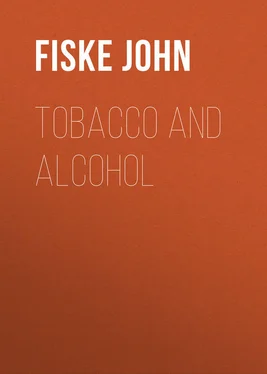John Fiske - Tobacco and Alcohol
Здесь есть возможность читать онлайн «John Fiske - Tobacco and Alcohol» — ознакомительный отрывок электронной книги совершенно бесплатно, а после прочтения отрывка купить полную версию. В некоторых случаях можно слушать аудио, скачать через торрент в формате fb2 и присутствует краткое содержание. Жанр: foreign_antique, foreign_prose, на английском языке. Описание произведения, (предисловие) а так же отзывы посетителей доступны на портале библиотеки ЛибКат.
- Название:Tobacco and Alcohol
- Автор:
- Жанр:
- Год:неизвестен
- ISBN:нет данных
- Рейтинг книги:4 / 5. Голосов: 1
-
Избранное:Добавить в избранное
- Отзывы:
-
Ваша оценка:
- 80
- 1
- 2
- 3
- 4
- 5
Tobacco and Alcohol: краткое содержание, описание и аннотация
Предлагаем к чтению аннотацию, описание, краткое содержание или предисловие (зависит от того, что написал сам автор книги «Tobacco and Alcohol»). Если вы не нашли необходимую информацию о книге — напишите в комментариях, мы постараемся отыскать её.
Tobacco and Alcohol — читать онлайн ознакомительный отрывок
Ниже представлен текст книги, разбитый по страницам. Система сохранения места последней прочитанной страницы, позволяет с удобством читать онлайн бесплатно книгу «Tobacco and Alcohol», без необходимости каждый раз заново искать на чём Вы остановились. Поставьте закладку, и сможете в любой момент перейти на страницу, на которой закончили чтение.
Интервал:
Закладка:
Here then we have obtained an important amendment of our notion of a narcotic. A narcotic is a substance which, taken in the requisite dose, causes paralysis. But we have seen that by diminishing the dose we at last reach a point where the narcotic entirely ceases to act as a narcotic and becomes a stimulant. What then is a stimulant? There is a prejudice afloat which interferes with the proper apprehension of this word. People call alcohol, indiscriminately, a stimulant; and when a man gets drunk, he is incorrectly said to be stimulating himself; stimulants are therefore looked at askance, as things which demoralize. The reader is already in a position to know better than this. He sees already that it is not stimulus but narcosis which is ruining the drunkard. Nevertheless, that he may understand thoroughly what a stimulant is, we must give further explanation and illustration.
Food and stimulus are the two great, equally essential factors or co-efficients in the process of nutrition. We mean by this, that in order to nourish your system and make good its daily waste, you need both food and stimulus. You must have both, or you cannot support life. Day by day, in every act of life, be it in the acts of working and thinking which go on consciously, or be it in the acts of digestion and respiration which go on unconsciously, in the mere keeping ourselves alive, we are continually using up and rendering worthless the materials of which our bodies are composed. We use up tissue as an engine uses up fuel; and we therefore need constant coaling. Tissue once used is no better than ashes; it must be excreted, and food must be taken to form new tissue. Now the wonderful process by which digested food is taken up from the blood by the tissues – each tissue taking just what will serve it and no more, muscle-making stuff to muscle, bone-making stuff to bone, nerve-making stuff to nerve – is called assimilation, nutrition, or repair. It is according as waste or repair predominates that we are feeble or strong, useless or efficient. When repair is greatly in excess, as it usually is in childhood and youth, we grow. When waste is greatly in excess, we die of consumption, gangrene, or starvation. When the daily repair slightly outweighs the daily waste, we are healthy and vigorous. When the daily repair is not quite enough to replace the daily waste, we are feeble, easily wearied, and liable to be assailed by some illness.
Now, in order to carry on this great process of nutrition, we have said that food and stimulus are equally indispensable. We must have food or we can have nothing to assimilate; but we must also have stimulus, or no assimilation will take place. The unstimulated tissue will not assimilate food. The nutritive material rushes by it, unsought for and unappropriated, and no repair takes place. There are some people whom no amount of eating will build up: what they need is not more food, but more nerve stimulus; they doubtless eat already more than their tissues are able to assimilate. In pulmonary consumption, the chief monster which we have to fight against is impaired nutrition, the tubercles being only a secondary and derivative symptom. 12 12 Indeed, there are many fatal cases in which tubercles never appear. See Niemeyer on Pulmonary Phthïsis .
The problem before us, in dealing with consumption, is to improve nutrition, to make the tissues assimilate food. And to this end we prescribe, for example, whisky and milk – a food which easily reaches the tissues, and a stimulant which urges them to take up the food sent to them. We define, therefore, a stimulant as any substance which, brought to bear in proper quantities upon the nervous system, facilitates nutrition .
At the head of all stimulants stands oxygen, concerning which, for further illustration, we shall quote the following passage from Dr. Anstie:
"It needs but a glance at the vital condition of different populations in any country to arrive at a tolerably correct idea of the virtues of oxygen as a promoter of health and a curer of disease. If we compare the physical condition of the inhabitants of a London alley, an agricultural village, and a breezy sea-side hamlet, we shall recognize the truth of the description which assigns to it the same therapeutic action as is exercised by drugs, to which the name of stimulant seems more naturally applicable than to such a familiar agent as one which we are constantly breathing in the common air. A child that has been bred in a London cellar may be taken to possess a constitution which is a type of all the evil tendencies which our stimulants are intended to obviate… It is highly suggestive to find that that very same quiet and perfect action of the vital functions, without undue waste, without pain, and without excessive material growth, is precisely what we produce, when we produce any useful effect, by the administration of stimulants, though, as might be expected, our artificial means are weak and uncertain in their operation, compared with the great natural stimulus of life." 13 13 Stimulants and Narcotics , p. 144.
Stimulus implies no undue exaltation of the activity of any part of the organism. In complete health all parts of the body should work together in unhindered co-operation. Any undue exaltation of a particular function – excessive brain-action, excessive muscular-nutrition, excessive deposit of fat – is a symptom of lowered life, in which the co-ordinating control of the whole system over its several parts is diminished. Stimulus, on the other hand, implies an increase of the co-ordinating and controlling power. Dr. Anstie therefore recommends that the word "overstimulation" be disused, as unphilosophical and self-contradictory.
In yet one further particular, current notions need to be rectified before we can proceed. In no case is the action of a stimulant followed by a depressive reaction. This seems at first like a paradox. Physiologists have in times past maintained the contrary; and some have even ventured to apply to the phænomena of stimulation the dynamic law that "action and reaction are equal and opposite." But in physiology we shall not be helped much by the theorems of mechanics. In no case is the stimulus followed by any other "recoil" than that which is implied in the mere gradual cessation of its action, just as in the case of food which has been eaten, assimilated, and used up. We quote the following from Dr. Anstie: – "We often hear the effects of strong irritation of the skin, or the mucous surfaces, quoted as an example of the way in which action and reaction follow each other. The immediate effect of such treatment (it is said) is to quicken the circulation and improve the vital condition of the part, but its ultimate result is a complete stagnation of the vital activities in the irritated tissues. The real explanation of the matter is, however, very different. Mild stimulation of the skin (as by friction, warm liniments, &c.) has no tendency to produce subsequent depression; nor has mild stimulation of the mucous membranes (as by the mustard we eat with our roast beef). But the application of an irritant strong enough to produce a morbid depression at all, produces it from the first . Thus the cantharidine of a blister has no sooner become absorbed through the epidermis than it at once deprives a certain area of tissue of its vitality to a considerable extent, as is explained by the researches of Mr. Lister… Here is no stimulation first and depressive recoil afterward, but unmitigated depression from the first." 14 14 Stimulants and Narcotics , p. 148.
"What has been commonly spoken of as the recoil from the stimulant action of a true narcotic is, in fact, simply the advent of narcosis owing to a large impregnation of the blood with the agent after the occurrence of stimulation, owing to a small one. Thus a man drinking four ounces or six ounces of brandy gradually, has not in reality taken a truly narcotic dose till perhaps half the evening has worn away; previously to that he has not been 'indulging in narcotism' at all; nor, had he stopped then, would any after depression have followed, for he might have taken no more than two ounces of brandy, equal perhaps to one ounce of alcohol. But he chose to swallow the extra two ounces or four ounces, thus impregnating his blood with a narcotic mixture capable of acting upon nervous tissue so as to render it incapable of performing its proper functions. The narcosis has no relation to the stimulation but one of accidental sequence. This is proved by the fact that in cases where a narcotic dose is absorbed with great rapidity, no signs of preliminary stimulation occur. " 15 15 Id. p. 224.
Интервал:
Закладка:
Похожие книги на «Tobacco and Alcohol»
Представляем Вашему вниманию похожие книги на «Tobacco and Alcohol» списком для выбора. Мы отобрали схожую по названию и смыслу литературу в надежде предоставить читателям больше вариантов отыскать новые, интересные, ещё непрочитанные произведения.
Обсуждение, отзывы о книге «Tobacco and Alcohol» и просто собственные мнения читателей. Оставьте ваши комментарии, напишите, что Вы думаете о произведении, его смысле или главных героях. Укажите что конкретно понравилось, а что нет, и почему Вы так считаете.












